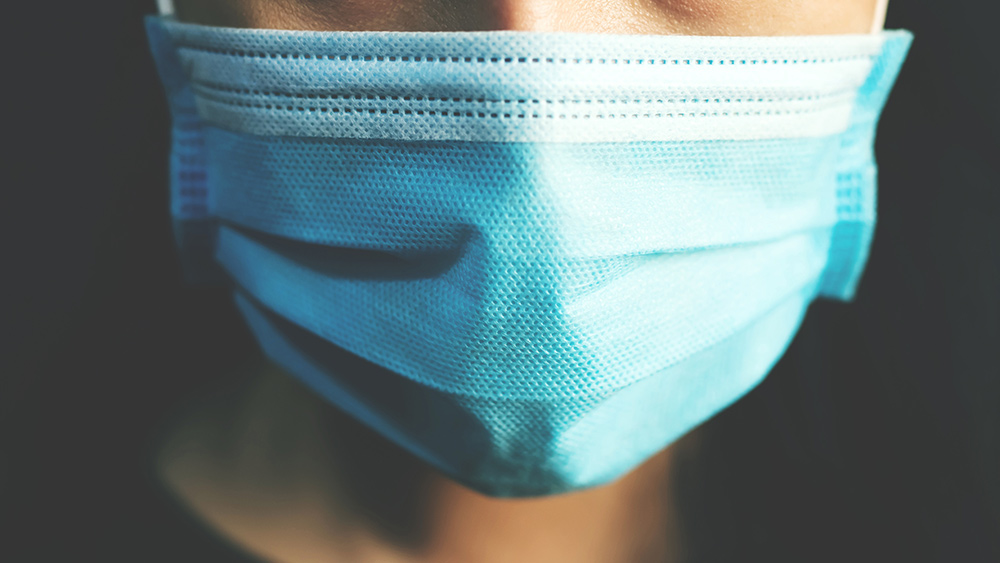Survey: Many Americans will continue wearing masks when sick, even after pandemic ends
08/11/2021 / By Nolan Barton

A Washington Post–Schar School survey found that two-thirds of Americans still plan to wear masks when sick once the coronavirus (COVID-19) pandemic ends. Two in three Americans also plan to wear comfortable clothes more often once the pandemic is over.
The poll points to the enduring cultural shifts the public health crisis may bring about. The nationwide survey was conducted by telephone on July 6-21 and involved a random sample of 1,000 adults. About 75 percent of them were reached on mobile phones, while 25 percent were surveyed on landlines. The margin of error was plus or minus four percentage points for the full sample.
Forty-three percent of those polled said they plan to still wear masks in crowded places after COVID-19 is no longer a threat. Fifty-four percent, however, said they do not plan to still use face coverings. (Related: CDC report admits mask-wearing provides no real protection against Covid.)
Virtual communication may remain popular once the pandemic ends. Forty-six percent of Americans said they plan to still socialize with family or friends virtually, compared to 52 percent who said they do not.
Americans expect to spend more time outdoors after COVID-19 pandemic
Nearly three-fourths of Americans expect to spend more time outdoors after the pandemic. Most adults expect to be outdoors more often – especially younger adults. More than 8 in 10 among those under 40 say that they intend to be outdoors more frequently.
The findings in the poll conducted by the Post and the Schar School of Policy and Government at George Mason University suggest that dressing casually while working from home, following public health advice and trying to avoid exposure to the virus are some adjustments Americans have made during the pandemic that are likely to linger broadly after the virus recedes.
More than half of adults who identify as Republicans say they plan to use masks when they are sick after the pandemic, despite disdain for mask-wearing by former President Donald Trump and steps by some GOP governors and state legislatures to ban mask mandates. The share of Democrats saying they expect to wear masks when they are sick in a post-pandemic world is higher at around 80 percent.
Almost half of Republicans describe their lives as having fully returned to the way they were while fewer than 1 in 6 Democrats felt the same way. Slightly more than one-third of Democrats say they teleworked during the previous month because of the coronavirus, compared with 1 in 7 Republicans.
More than half of Republicans say they have attended crowded indoor events and crowded outdoor events, which is significantly higher than the share of Democrats who say they have done the same.
Some basic behaviors people expect to persist are nearly identical for Republicans and Democrats and for men and women. People hold in common plans to wear comfortable clothing more often and to spend more time outdoors. Regardless of political affiliation or gender, roughly 4 in 10 adults say they intend to have telemedicine appointments with doctors once the pandemic ends.
COVID-19 pandemic brings about cultural revolution
According to Robert Blendon, a professor of health policy and political analysis at Harvard University who specializes in public attitudes, the coronavirus pandemic is bringing about a cultural revolution.
“This is not unlike post-World War II,” Blendon said. “Thousands of people have died. You had to change your lifestyle, where you work, where your kids are.”
The seriousness of a mass event influences the extent to which it prompts cultural change, Blendon said. He pointed out that the 9/11 terrorist attacks happened on a single day, but it was grave enough that it “got people used to standing in line and being screened at airports.”
Blendon said the coronavirus pandemic is both serious and long-lasting, having been declared 17 months ago and providing no sign of when it will end. “We are going to see a more California lifestyle, less formal dress. People are going to avoid larger crowds for quite a while. It will look culturally very different,” he said.
Laura Spinney, the author of a recent book on the 1918 flu pandemic and its aftereffects, said that people in many countries shed pandemic behaviors relatively quickly. While the flu pandemic sparked the habit in Japan of wearing a mask to protect others when someone has a cold or other infectious illness, that habit did not last in the U.S. and Western Europe.
According to Spinney, behavioral changes may end up enduring more among certain groups when the pandemic ends. Older adults may still stay away from crowds because they have felt especially vulnerable to COVID-19 while children may continue to put on masks because their early memories include wearing them outside their home.
Cultural changes are more likely to endure if behaviors adopted in a pandemic “converge with a preexisting trend,” Spinney said, noting that teleworking and making clothing choices suitable to working from home are likely to stay. (Related: Washington county of 2.2 million recommends ALL employees work from home as New York also declares state of emergency over coronavirus.)
Follow Pandemic.news for more news and information related to the coronavirus pandemic.
Sources include:
Tagged Under: coronavirus, covid-19, covid-19 pandemic, cultural change, Cultural Revolution, cultural shift, flu pandemic, health crisis, infections, mask wearing, mental health, outbreak, Public Health
RECENT NEWS & ARTICLES
COPYRIGHT © 2017 PLAGUE INFO





















